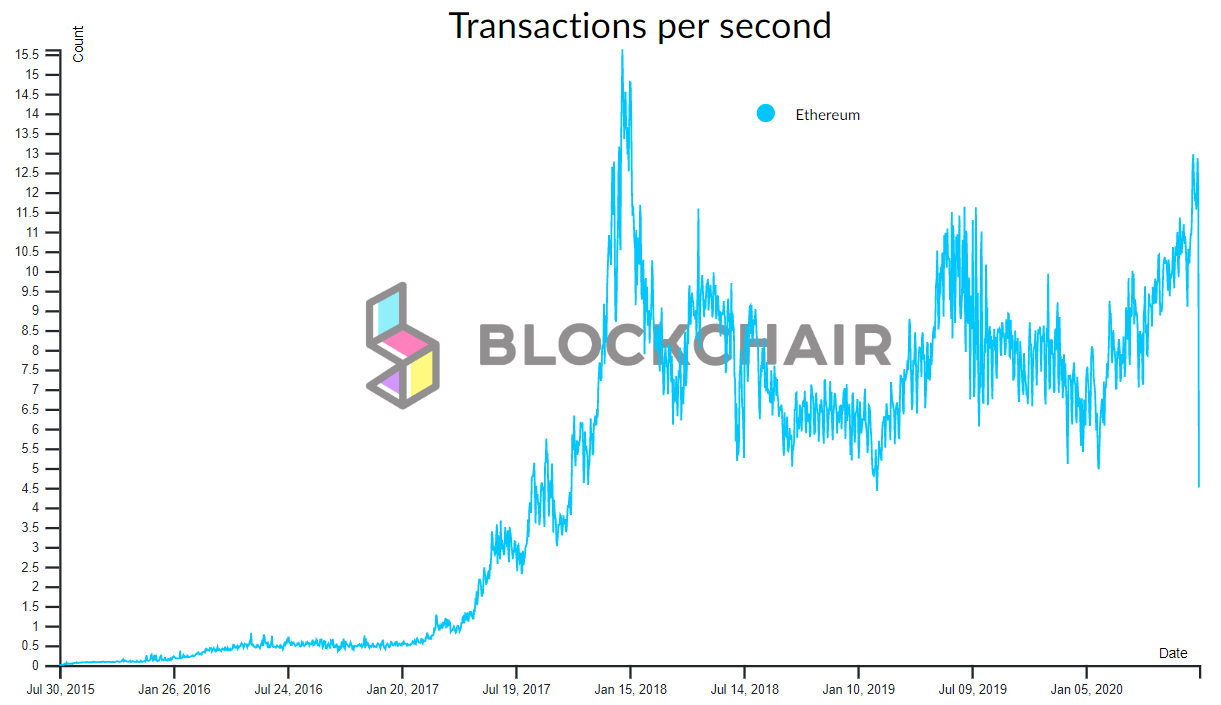 Ethereum co-founder says “rollups” will power ETH 2.0 to 100k TPS
Ethereum co-founder says “rollups” will power ETH 2.0 to 100k TPS Ethereum co-founder says “rollups” will power ETH 2.0 to 100k TPS

Photo by David Becker on Unsplash
The transaction per second (TPS) metric is informally considered the standard for the scalability of any blockchain.
High TPS means a battle-tested network capable of scalability and fast processing of user transactions. This partly helps in positioning blockchain as a steady alternative to centralized providers.
Currently, Bitcoin provides 4 TPS, while Ethereum goes up to 15. Smaller coins like NEO and Cardano boast of or are building a framework for reaching 1,000 TPS, while Komodo claims to have reached the 45k per second mark in testing.
Now, with ETH 2.0 coming up, the protocol might see over 100,000 TPS gradually, with plans for eventually scaling to over a million as “sharding” is deployed.
If that happens, the popular argument of public blockchains being slower than VISA is set to be toppled.
Six-figure TPS coming to Ethereum
Vitalik Buterin, the 26-year-old co-founder of Ethereum, tweeted earlier this week:
ETH2 scaling for data will be available *before* ETH2 scaling for general computation. This implies that rollups will be the dominant scaling paradigm for at least a couple of years: first ~2-3k TPS with eth1 as data layer, then ~100k TPS with eth2 (phase 1). Adjust accordingly.
— vitalik.eth (@VitalikButerin) June 30, 2020
Buterin said ETH 2.0 scaling for data will be available before that for general computation, explaining the 2-3k TPS with ETH 1.0 as a data layer, “then ~100k TPS with ETH 2.0 (phase 1).
In thread comments, Buterin noted “rollups could potentially go up into the thousands or more,” adding that shards didn’t “need to talk to each other synchronously to be able to have a synchronous rollup that combines the shards’ scalability.”
On a relevant Reddit post, Buterin laid out the math:
“64 shards * 256 kB per block per shard / 12s slot time = 1.33 MB/sec. Rollups: ~10-12 bytes per tx if packed optimally. 1.33m / (10…12) > 100k.”
He added the calculations assumed that rollups “are ready, phase 1 sharding is ready, and people actually use the tech.”

What are rollups anyway?
For the uninitiated, rollups are layer-2 frameworks that help the network scale-up to multiples of present levels. In its most fundamental form, rollups store transactional data on the Ethereum blockchain in a compressed form, with the heavy-working computation occurring off-chain.
An example is Optimistic rollups, first proposed by Buterin in 2018 and now developed by Plasma. Some teams are building application-specific zk-Rollups as well—iterating on the same architectural design to suit their needs.
Two ZK rollups are on mainnet, optimistic rollups capable of supporting GENERIC ETHEREUM CONTRACTS (which plasma can't do) are entering testing stages.
— vitalik.eth (@VitalikButerin) June 26, 2020
Another team is Matter Labs, with its zk-Sync product described as “zk-Rollups on steroids” by Ben DiFrancesco, a blockchain developer who also writes a popular newsletter on relevant topics.
Matter uses zero-knowledge proofs, the same tech used by Zcash, allowing for faster transactions than other similar solutions.



 Farside Investors
Farside Investors 


 CoinGlass
CoinGlass 











































































































